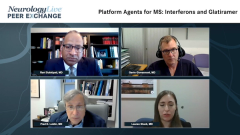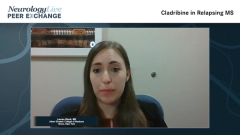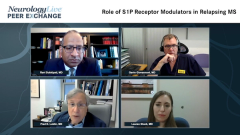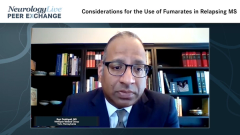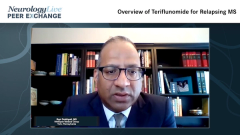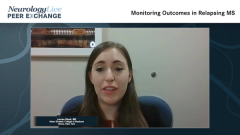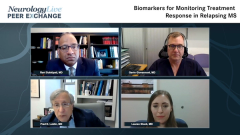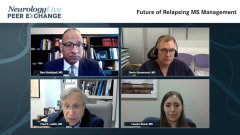
Anti-CD20 Agents for Relapsing MS
A panel of experts discuss the use of anti-CD20 monoclonal antibodies in relapsing multiple sclerosis including summaries of the phase III ORATORIO and ASCLEPIOS trials, for ocrelizumab and ofatumumab, respectively.
Episodes in this series

Fred D. Lublin, MD: Let’s move onto another class of agents, the anti-CD20s. Lauren, why don’t you take us through that?
Lauren Gluck, MD: For ocrelizumab, the trials first studied relapsing remitting MS [multiple sclerosis], and then primary progressive MS when the data was published in 2017, which was exciting because besides mitoxantrone [chemotherapy], this is the only positive study done in a progressive population. Ocrelizumab was based on its older sister drug rituximab, which we knew targeted CD20 B cells and had disease-modifying properties for multiple sclerosis in an empiric and retrospective manner. Ocrelizumab was the updated, fully humanized monoclonal antibody version of rituximab and showed significant improvement against platform therapies, specifically interferon beta, in reducing annualized relapse rate, decreasing sustained disability, and new enhancing lesions abundantly. The second part of this was the ORATORIO study on primary progressive MS, where they showed a statistically significant decrease in disability compared to the placebo—which was no medication at all—because none had been FDA approved for progressive MS at the time. The numbers weren’t as clinically overwhelming in the analysis. Disability progression decreased by about 25%, which is better than the alternative for sure, but when you have patients in your office, it’s good to set expectations about what that means. It’s hard to visualize: if you start this medicine today for your primary progressive MS, and next year you feel worse or you have more disability, does that mean the drug was unsuccessful? Likely, the answer is no, but the medication doesn’t have a 100% effectiveness at decreasing disability, unfortunately.
One of the big questions from this study was regarding its risk of malignancy. We were talking about cladribine earlier, and in this particular study, several women were diagnosed with breast cancer in the ocrelizumab experimental arm, and no one in the placebo, or comparator arm, had breast cancer. So there is a warning about ocrelizumab and breast cancer, which doesn’t seem to have trended in that direction with post marketing studies. But with any immunosuppressants, we should be encouraging our patients to get age-appropriate cancer screenings. If they are female, they should stay up-to-date with their mammograms whenever their primary care doctor or gynecologist recommends it. It is something to mention up front, for patients to understand everything going on, but also to limit their worry, that they’re not guaranteed to get breast cancer with this drug. I think we have all seen very low to no rates of breast cancer with this drug compared with the average population.
Fred D. Lublin, MD: OK, and ofatumumab?
Lauren Gluck, MD: Ofatumumab is an even newer version of a CD20 antibody. It was approved by the FDA several months ago. Its big hallmark update is that instead of having to go to an infusion center twice a year, you can give yourself injections at home with an autoinjector. Patients don’t even need to see the needle. It is very convenient. It’s very good for patients who may not have access to a MS center nearby, or if they live several hours away from their physician. That can be a big improvement in their quality of life. The research behind it was very strong. Its comparator drug was a different medication, teriflunomide [immunomodulatory agent], which also showed about a 50% reduction in annualized relapse rate, in new T1 contrast enhancing lesions, in T2 lesion accrual, as well as neurofilament light chain, a biomarker we’re using more often now. The duration of the studies lasted about 1 and a half years per patient. We expect more to come out on the drug’s effect on disability progression and longer term annualized relapse rate reduction, which is very exciting.
Fred D. Lublin, MD: This has been a very useful class of agents. In the United States, it has spun up to a lot of usage and good success. Ravi, any experience with these?
Ravi Dukkipati, MD: Nice summary of both. I believe the B-cell depleters, ocrelizumab and ofatumumab, represent the highest efficacy options we have for patients with MS. For certain patients, that is the ideal option: patients with a higher degree of disease activity or breakthrough disease activity on existing agents. The one potential area of concern in some patients is the long term, especially the older patient. I would tie that into long-term potential for certain infections and to the point of malignancy. It’ll be interesting to see the long-term data evolve in terms of prolonged B-cell suppression and its manifestations. The other thing to keep in mind these days is the vaccine component, that is, in this era of COVID-19. But there’s no question that these are the highest efficacy drugs we have currently.
Lauren Gluck, MD: I want to say that for how effective it is, it has one of the lower risk profiles compared to other strong immunosuppressants, maybe barring cladribine. But looking at something like alemtuzumab, this has a lot less risk associated with it and a lot less monitoring. But again, this raises the question of how long do we keep patients on these medicines safely?
Fred D. Lublin, MD: Gavin?
Gavin Giovannoni, MD: Yes. I think one of the downsides of the anti-CD20 is the impact on the end organ. The brain volume data, to me, is very poor compared to some of the other higher efficacy treatments like alemtuzumab and even natalizumab. I think there’s a ceiling or floor effect when it comes to suppressing inflammatory activity, relapses, and new enhancing lesions. There’s something not quite right about it, and it’s coming out. We saw that when we looked at the exposure to ocrelizumab based on body size and B-cell depletion, that those who got the highest exposure, the best B-cell depletion, did better on disability progression. I think there’s still more to be done around optimizing the dose of anti-CD20 therapy, and we haven’t learned everything about it yet. Yes, it is very effective and relatively safe in the short term, but I worry about the long-term safety. When you look at the Swedish safety database, where they’ve been using anti-CD20 antibodies for probably about 7 to 8 years in a large proportion of their patients—about two-thirds of the patients in Sweden are on an anti-CD20—you’re beginning to see severe bacterial infections starting to develop around year 5, 6, and 7. I worry that we’re going to have a problem with the anti-CD20 therapies when we start having people on them for 10, 15, 20 years. That’s my worry. We need an exit strategy. How do we de-risk them, put them onto something that’s safer, without the infection risk?
Fred D. Lublin, MD: This is a very good point, and of course, following B-cell counts is useful but also following immunoglobulin, because that’s where it seems to correlate with bacterial infection, when the IgG [immunoglobulin G] gets low. But as a class of agents, I agree with Ravi. This has been a remarkably successful agent among our people, and our first agent to show any effect in progressive MS, which belies the brain atrophy data, independent of activity, as best one can tell from the studies. So that opens the door. It’s a very modest effect, and we need to do better on progressive MS. At least it opens the door for treating, not prolonging, the disease.
Thank you all for watching this NeurologyLive® Peer Exchange. If you enjoyed the content, please subscribe to our e-newsletters to receive upcoming Peer Exchanges and other great content right in your inbox. Thank you for joining us.
Transcript Edited for Clarity
Newsletter
Keep your finger on the pulse of neurology—subscribe to NeurologyLive for expert interviews, new data, and breakthrough treatment updates.


